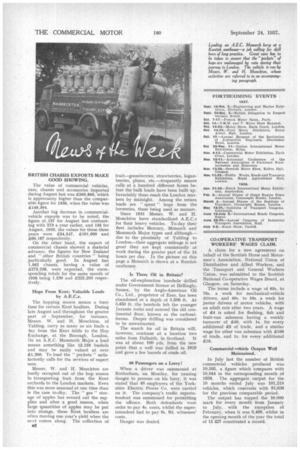BRITISH CHASSIS EXPORTS MAKE GOOD SHOWING.
Page 36

If you've noticed an error in this article please click here to report it so we can fix it.
The value of commercial vehicles, cars, chassis and accessories imported during August last was £260,865, which is appreciably higher than the comparable figure for 1936, when the value was £149,394.
Another big decrease in commercialvehicle exports was to be noted, the figure of. 137 for August last contrasting with 273 a year earlier, and 135 for August, 1935; the values for these three years were £84,547, £101,690 and £60,187 respectively.
On the other hand, the export of commercial chassis showed a material advance, the figures for New Zealand and " other British countries " being particularly good. In August last 1,562 chassis, having a value of £273,238, were exported, the corresponding totals for the same month of 1936 being 1,239 and £225,293 respectively.
Hops From Kent; Valuable Loads by A.E.C.s.
The hopping season means a busy time for certain Kent hauliers. During late August and throughout the greater part of September, for instance, Messrs. W. and H. Monckton, of Yalding, carry as many as six loads a lay from the Kent fields to the Hop Exchange, at the Borough, London. On an A.E.C. Mammoth Major a load means something like 12,150 bushels and may be easily valued at over £1,200. To load the " pockets " satisfactorily calls for the services of expert men.
Messrs. W. and H. Monckton are busily occupied out of the hop season in transporting fruit from the Kent orchards to the London markets. Even this was more seasonal at one time than is the case to-day. The " gas " storage of apples has evened out the supplies and after a good season, when large quantities of apples may be put into storage, these Kent hauliers are often moving one year's yield when the next comes along. The collection of 22 fruit—gooseberries, strawberries, loganberries, plums, etc.—frequently means calls at a hundred different farms before the bulk loads have been built up. Invariably these reach the London markets by midnight. Among the return loads are " spent " hops from the breweries, these being used as manure.
Since 1931 Messrs. W. and H. Monckton have standardized A.E.C.s for their heavy vehicles. To-day their fleet includes Mercury, Monarch and Mammoth Major types and although— due to the proximity of Yalding to London—their aggregate mileage is not great they are kept consistently at work during the greater part of the 24 hours per day. In the picture on this page a Monarch is shown at a Kentish oasthouse.
Is There Oil in Britain?
The oil-exploration borehole drilled under Government licence at Hellingly, Sussex, by the Anglo-American Oil Co., Ltd., proprietor of Esso, has been abandoned at a depth of 3,506 ft. At 3,450 ft. the borehole left the younger Jurassic rocks and entered the old continental floor, known as the carboniferous. Deeper drilling was considered to be unwarranted.
The search for oil in Britain will, however, continue at a location two miles from Dalkeith, in Scotland. It was at about 100 yds. from the new point that a well was drilled in 1919 and gave a few barrels of crude oil.
48 Passengers on a Lorry!
When a driver was summoned at Rotherham, on Monday, for causing danger to persons on his lorry, it was stated that 48 employees of the Yorkshire Electric Power Co. were carried on it. The company's traffic superintendent was summoned for permitting the offence. Both defendants were order to pay 4s. costs, whilst the superintendent had to pay 6s. 9d. witnesses' costs.
Danger was denied.
CO-OPERATIVE TRANSPORT WORKERS' WAGES CLAIM.
A claim for a new agreement on behalf of the Scottish Horse and Motormen's Association, National Union of Distributive and Allied Workers, and the Transport and General Workers Union, was submitted to the Scottish National Co-operative Wages Board, at Glasgow, on Saturday.
The terms include a wage of 65s. to 75s. a week for mechanical-vehicle drivers, and 40s. to 50s. a week for junior drivers of motor vehicles, with an adult rate after two years. A wage of £4 is asked for fleshing, fish and fruit-van salesmen having a weekly turnover of £40, with 15. for every additional £5 of trade, and a similar wage for other van salesman with £100 of trade, and is. for every additional £10.
Commercial-vehicle Output Well Maintained.
In July last the number of British commercial vehicles produced was 10,305, a figure which compares with 10,044 in the corresponding month of 1936. The aggregate output for the 10 months ended July was 101,318 vehicles, which contrasts with 91,036 for the previous comparable period.
The output has topped the 10,000 mark for every month from January to July, with the exception of February, when it was 8,468, whilst in the opening month of the year the total of 11.427 constituted a record.




























































































